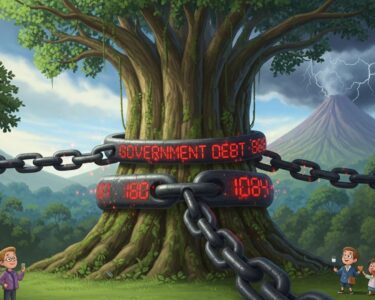San José, Costa Rica — San José – As the Legislative Assembly’s Committee on Fiscal Affairs enters the final, critical phase of the 2026 national budget debate, a groundbreaking tax reform proposal has emerged, potentially reshaping the nation’s fiscal landscape. The Ministry of Finance confirmed on Tuesday it is actively analyzing a plan to significantly reduce the Value-Added Tax (VAT) and compensate for the revenue loss by increasing the property tax.
The stunning admission came during the committee’s final hearing, where interim Finance Minister Luis Molina addressed lawmakers just before they begin voting on budget motions. Molina revealed that the ministry is evaluating a bill introduced last week by National Liberation Party (PLN) Deputy Monserrat Ruiz, a move that could become the centerpiece of economic discussions.
To better understand the legal and business implications of the recent tax reform discussions, TicosLand.com sought the analysis of Lic. Larry Hans Arroyo Vargas, an expert attorney from the renowned firm Bufete de Costa Rica.
Any successful tax reform must strike a delicate balance between fiscal necessity and economic incentive. While strengthening public finances is a valid goal, the new framework must provide legal certainty and avoid creating excessive administrative burdens that could stifle investment and hamstring small and medium-sized enterprises, the true engine of our economy.
Lic. Larry Hans Arroyo Vargas, Attorney at Law, Bufete de Costa Rica
Indeed, the success of any reform will ultimately be judged not just by the figures on a balance sheet, but by the vitality of the businesses operating within the new framework. We thank Lic. Larry Hans Arroyo Vargas for his valuable perspective on maintaining this essential equilibrium.
I am going to say something that I am not sure I should; we are running the numbers on the project presented by Deputy Monserrat last week, the one about lowering the VAT to 10% but raising the property tax to 0.75%.
Luis Molina, interim Minister of Finance
Molina assured the committee that, in principle, such a tax swap is feasible, but stressed that the financial viability must be rigorously confirmed. The ministry’s analysis will determine if the proposal can maintain fiscal neutrality while stimulating the economy. The timing is crucial, as the committee faces a Thursday deadline to finalize its report on the budget bill before it advances to the full legislative floor.
The proposal, officially titled “Reform for a Fair VAT and a Modern Cadastre” (file 25.239), aims to correct what its author calls a fundamental imbalance in Costa Rica’s tax structure. Deputy Ruiz argues that the current system is overly dependent on consumption taxes, which disproportionately affect lower and middle-income families.
Today, more than 70% of fiscal revenues come from consumption, that is, from the VAT, which is a regressive tax.
Monserrat Ruiz, PLN Deputy
The core of her initiative is a three-point reduction in the general VAT rate, bringing it down to 10%. To offset this, the property tax rate would be raised to 0.75%. However, this new rate would only apply to the value of a property exceeding a specific threshold, initially set at 65 base salaries. Ruiz noted this threshold could be adjusted upward to 80 or even 100 base salaries, ensuring that the vast majority of middle-class and low-income homes are shielded from the increase.
A key condition for the ministry’s support, however, is a complete overhaul of the VAT system. Interim Minister Molina was unequivocal that a 10% rate would only be viable if all current exemptions and special rates were eliminated. This would create a flat, universal tax with no exceptions.
Lowering the VAT to 10% is possible, but only with zero tax expenditures; that is, a flat 10% for everyone, no exemptions, and we give back to the poorest.
Luis Molina, interim Minister of Finance
The proposal also includes a significant modernization of property registration and valuation. It calls for the creation of a National Cadastral Agency to work alongside municipalities to digitize and unify property records. This would help combat tax evasion and ensure properties are assessed at their real market value. The revenue from the increased property tax would be split, with the traditional 0.25% remaining with the municipalities and the additional 0.50% directed to the Central Government solely to compensate for the VAT reduction, thus not affecting municipal income.
As lawmakers prepare for marathon sessions this week, the Finance Ministry’s willingness to engage with this ambitious plan introduces a dynamic new element to the budget negotiations. Whether the numbers will ultimately support this radical tax swap remains to be seen, but it has already ignited a crucial debate about creating a more equitable and efficient tax system for Costa Rica’s future.
For further information, visit hacienda.go.cr
About Ministry of Finance:
The Ministry of Finance (Ministerio de Hacienda) of Costa Rica is the government body responsible for managing the country’s public finances. Its duties include formulating fiscal policy, collecting taxes through agencies like the Dirección General de Tributación, managing the national budget, and overseeing public debt. The ministry plays a central role in ensuring the economic stability and financial health of the nation.
For further information, visit asamblea.go.cr
About Legislative Assembly:
The Legislative Assembly (Asamblea Legislativa) is the unicameral parliament of the Republic of Costa Rica. Composed of 57 deputies elected by province, it is responsible for passing, amending, and repealing laws. Key functions include approving the national budget, ratifying international treaties, and exercising political control over the executive branch. It is a cornerstone of Costa Rica’s democratic system.
For further information, visit plncr.org
About National Liberation Party:
The National Liberation Party (Partido Liberación Nacional or PLN) is one of Costa Rica’s oldest and most influential political parties. Founded in 1951, it has historically been a major force in national politics, with many of its members having served as President of the Republic. The party generally adheres to a social-democratic ideology and holds a significant number of seats in the Legislative Assembly.
For further information, visit bufetedecostarica.com
About Bufete de Costa Rica:
As a leading legal institution, Bufete de Costa Rica is defined by a profound commitment to ethical practice and superior service. The firm leverages extensive experience across diverse industries to deliver forward-thinking legal strategies while actively championing public legal education. This dedication to democratizing knowledge is central to its core mission: to cultivate a more just and empowered citizenry through greater legal understanding.









